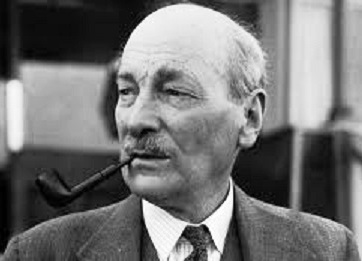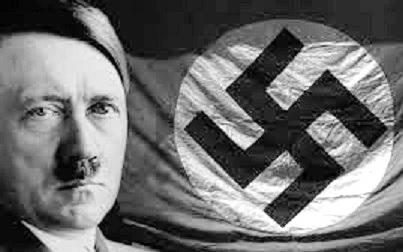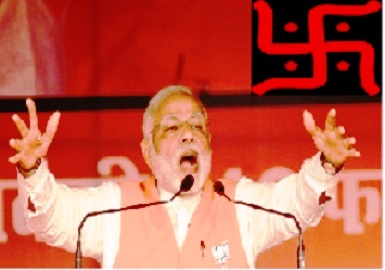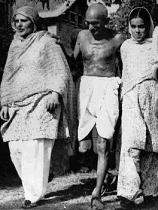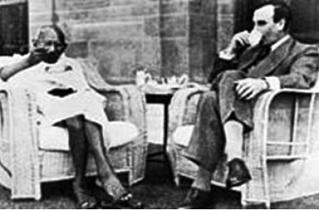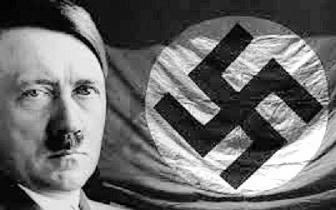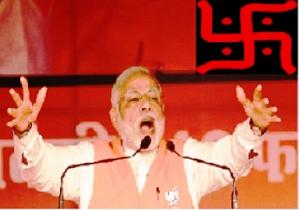Mahatma’s help intensifies Kashmir’s political desolation
Mahatma Gandhi is believed to have said: "that in an age of Empire and Military Might, the powerless had power and that force of arms would not forever prevail against force of spirit". Father of the Indian nation is also believed to have struggled to free his nation from bondage and occupation. However, many world over believe that Führer Hitler was mainly responsible for helping India get its independence. Hitler had to lose his mind to start the world war resulting in a huge economic setback for United Kingdom leaving Prime Minister Clement Attlee no option but to leave India in haste.
Visualising a ray coming out of Kashmir, Gandhi eventually reached Srinagar on August 01, 1947 and went on for a call at Jammu on August 5. Gandhi spent much time with Begum Jehanara Abdullah, had talks with Maharaja Hari Singh and Pandit Ram Chand Kak Prime Minister of Maharaja Hari Singh´s government. Gandhi on a special mission was to take over the responsibility of roping in nationalists Maharaja and his Prime Minister as both did not see eye to eye with Pandit Nehru. Maharaja even stopped Nehru from entering Kashmir at Kohala and kept him in custody at least for three days. The curtains were drawn for the drama enacted providing finishing touches offered by the Mahatma.
Describing Mahatma Gandhi, Thomas C. Mountain on March 20, 2006 had this to say" In India, supposedly the worlds largest democracy, the leadership of the rapidly growing Dalit movement has nothing good to say about Mohandas K. Gandhi. To be honest, Gandhi is actually one of the most hated Indian leaders in the hierarchy of those considered enemies of India's Dalits or untouchables by the leadership of India´s Dalits".
Mahatma Gandhi managed to convince Maharaja Hari Singh to concede the Nehru backed demand of Kashmiri leader Sheikh Abdullah for installing a ´democratic government´; a demand having no relevance keeping in view the changing political scene of the entire Indian sub-continent. A naïve Sheikh was hoodwinked with false verbal promise of Independent State of Kashmir with a precondition that popular leader Abdullah must strive for a status of a democratic and secular State by ousting despotic Maharaja. Thus, Sheikh Abdullah was taken for ride by his only friend in India Pandit Nehru who stabbed him in the back followed by prison sentences in various Indian jails to die in oblivion.
It is argued that historically Maharaja Hari Singh was a Nationalist and wanted to maintain the independent status of his State of Kashmir. Political pundits believe that Sheikh Abdullah should have supported Maharaja instead, to allow him carry on with running the government and support Maharaja’s clever ploy to sign the standstill agreements with India and newly created nation of Pakistan. The anarchic political situation unfolding in the sub-continent would have left Kashmir untouched by India and Pakistan as both had multiple problems to worry about.
The question of tribal invasion would not arise if the Kashmiri leadership on the other side of Kashmir controlled now by Pakistan would not panic and act without involving Pakistan army. Indian conspiracy to pull the wool over Sheikh Abdullah with a clear intent to annex Kashmir, keeping in view the newly created Pakistan struggling to get on the feet and survive, paid dividends. India made its calculations but failed to realize the commitments made while accepting the partition of the country and chose to backtrack on promises made to Sheikh and on international level by dragging the issue using one pretext or another.
Campbell Johnson in his (page 117) writes "Both Nehru and Gandhi have been very anxious that Maharaja of Kashmir should make no declaration of independence. To clear this anxiety Gandhi visited Kashmir by the end of July 1947. The windows of his car were shattered in Baramulla, where an angry crowd protested his visit. Nevertheless, he was to go ahead and obtain a cure for his and Nehru´s anxiety: a guarantee of Maharaja´s accession to India. But the Union of India has been taking a lively interest in the subject and indications are that the Hindu Maharaja of Kashmir, Sir Hari Singh, has lately been much influenced by representations made by Gandhi who visited Kashmir three months ago and by other congress leaders."
The Times, London, October 25th, 1947 in its report records "After his visit, the Prime Minister of Kashmir, Ram Chand Kak, who was not inclined towards India was replaced by Raja Janak Singh and then by the Indian loyalist, Mehr Chand Mahajan. The British officers in the Kashmir Army and Police were dismissed including the Inspector General of Police and the Chief of the General Staff. It is interesting that after all this lobbying; the Maharaja still did not sign the instrument of accession".
To his followers, he was a saint. To the British bureaucrats, he was a conniving politician, a bogus Messiah whose non-violent crusade always ended in violence and whose fast unto death always stopped short of death´s door. Even a man as kind hearted as Wavell, detested him as a malevolent old politician, shrewd, obstinate, domineering, double tongued; with little true saintliness in him. (Larry Collins and Dominique Lapierre - Freedom at Midnight) However, Albert Einstein is quoted to have said the future generation will scarcely believe that such a man in flesh and blood had tread on this earth.
M. K. Gandhi, pioneer and perfect in Satyagraha, played a very shadowy role in the politics of Kashmir. He was successful in preventing the Maharaja of Kashmir from declaring independence and thus paved the way for a forceful accession of Kashmir. The events of the summer of 1947 reveal astonishing facts about Gandhi and thus his role in the present conflict of Kashmir, a conflict that has the potential of sparking a nuclear war between India and Pakistan.
Columnist Swaminathan Aiyar of New Delhi wrote in the Times of India "We promised Kashmiris a plebiscite six decades ago. Let us hold one now, and give them three choices: independence, union with Pakistan, and union with India. Let Kashmiris decide the outcome, not the politicians and armies of India and Pakistan."
Comments
There are 0 comments on this post


